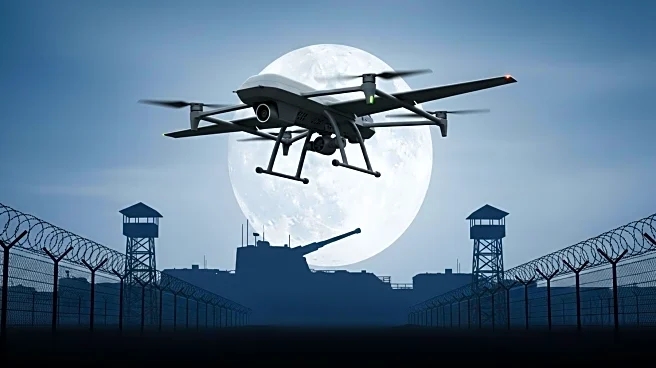What's Happening?
The Danish defense ministry has confirmed the presence of drones over Skrydstrup Air Base and the Jutland Dragoon Regiment, raising security concerns. This follows a series of drone sightings that have disrupted Denmark's airspace, temporarily shutting down major airports. Danish Prime Minister Mette Frederiksen has described the situation as part of a 'hybrid war,' suggesting the involvement of a 'professional actor.' Although local media reported sightings above Denmark's largest military base near Karup, the defense ministry has not confirmed these reports. In response to the escalating situation, Denmark has accepted Sweden's offer to lend military anti-drone capabilities ahead of an EU leaders' meeting in Copenhagen. Similar drone activities have been reported in neighboring countries, including Germany, where authorities suspect espionage.
Why It's Important?
The drone incidents over Danish military bases highlight growing security challenges in Europe, particularly concerning unmanned aerial vehicles. The situation underscores the vulnerability of critical infrastructure to potential espionage or sabotage, which could have significant implications for national security. The involvement of a 'professional actor' suggests a sophisticated threat that may require international cooperation to address. The acceptance of Sweden's anti-drone capabilities indicates a proactive approach to mitigating risks and protecting airspace integrity. These developments could influence defense policies and strategies across Europe, prompting increased investment in anti-drone technologies and collaborative security measures.
What's Next?
Denmark is expected to enhance its surveillance and defense mechanisms to counter the drone threat. The upcoming EU leaders' meeting in Copenhagen may serve as a platform for discussing broader security strategies and cooperation among member states. Stakeholders, including defense ministries and international security agencies, are likely to explore technological solutions and intelligence-sharing frameworks to prevent future incidents. The situation may also prompt legislative actions to regulate drone usage and strengthen airspace security protocols.
Beyond the Headlines
The drone incidents raise ethical and legal questions about the use of unmanned aerial vehicles in sensitive areas. The potential for drones to be used in espionage or sabotage activities challenges existing international norms and may lead to calls for stricter regulations. Additionally, the situation highlights the need for balancing technological advancements with security concerns, as drones become increasingly accessible and capable. Long-term, this could lead to shifts in how countries approach airspace management and defense strategies.










